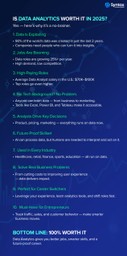It’s a fair question — especially in 2025, when AI seems to be everywhere, job roles are changing fast, and people are either rushing to learn prompt engineering or worrying if their current job will survive.
So if you’re looking at a data analytics course, a job ad, or even thinking about switching careers and wondering, “Is this still a smart move?” — you’re definitely not alone.
Let’s skip the fancy terms and talk honestly — based on what’s really happening in the job market and how businesses are making decisions today.

There’s More Data Than Ever — But Not Enough People to Make Sense of It
Every day, the world is generating massive amounts of data — from websites, apps, social media, sensors, and more. But here’s the thing: most companies still struggle to understand what all that data actually means.
They collect it, store it… and then get stuck.
That’s where data analysts come in — to help turn that mess of numbers into useful insights. And even though AI tools are getting better, they still can’t fully understand a company’s goals, customer habits, or real-world problems. That kind of thinking still needs a human.
So the need for data professionals isn’t going away — it’s growing.
AI Isn’t Replacing Analysts — It’s Replacing the Mundane
There’s a difference between automation and analysis. AI can generate reports. It can summarize trends. But it can’t decide if your company should launch in a new market, fix a broken funnel, or make sense of a messy dataset based on real business understanding.
In fact, smart analysts who use AI tools (like ChatGPT, Code Interpreter, AutoML, etc.) are 10x more powerful now — they do in hours what used to take days. AI has made good analysts more efficient, not obsolete.
If you’re scared AI is replacing analysts, think of it this way: it’s replacing bad analysts — the ones who just push buttons without thinking.
Still One of the Most In-Demand Roles in 2025
According to Glassdoor and LinkedIn data from this year:
- Data Analyst is still ranked among the Top 10 most in-demand jobs globally.
- Job postings that mention data analysis or visualization skills have grown by 30–40% YoY in sectors like healthcare, finance, retail, and logistics.
- Even in recession-hit markets, data roles are being seen as essential rather than expendable. Because when businesses are bleeding, they don’t guess — they analyze.
Even better, this demand isn’t just in big tech. Local businesses, NGOs, media houses — they all need insights. The playing field is way bigger than you think.
Career Growth Is Real, Not Just Hype
Data Analytics is a gateway role. It’s not a dead-end job.
People move from Data Analyst → Business Analyst → Analytics Manager → Product Owner ��→ Strategy Lead — or even pivot into Data Science or AI if they want. And every step tends to come with more influence, better pay, and higher decision-making power.
It’s not just a job. It’s a career ladder with multiple exits and growth routes — something many jobs can’t promise right now.
It’s a “Survivor Skill” in an Uncertain Job Market
The way things are going — layoffs, automation, changing job titles — you want a skill that works across industries. Something that doesn’t trap you in one narrow niche.
Data Analytics does that. You can work in retail, switch to healthcare, move to sports or e-commerce — without completely starting over. The tools and logic largely carry over.
Final Thoughts
So, is data analytics still worth it?
Yes — especially if you want to solve real problems, stay flexible, and grow with the changes happening around us.
It’s not just about making reports or dashboards. It’s about staying useful in a world full of data. And in 2025, if you can help people understand what’s going on and make better decisions — that’s a skill that will always be in demand.

